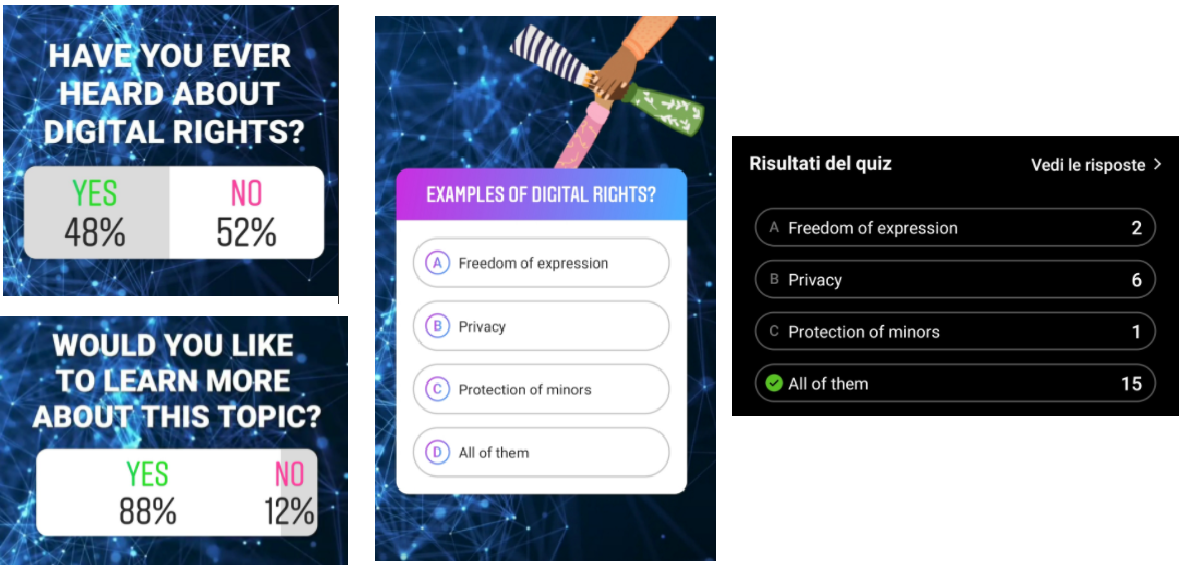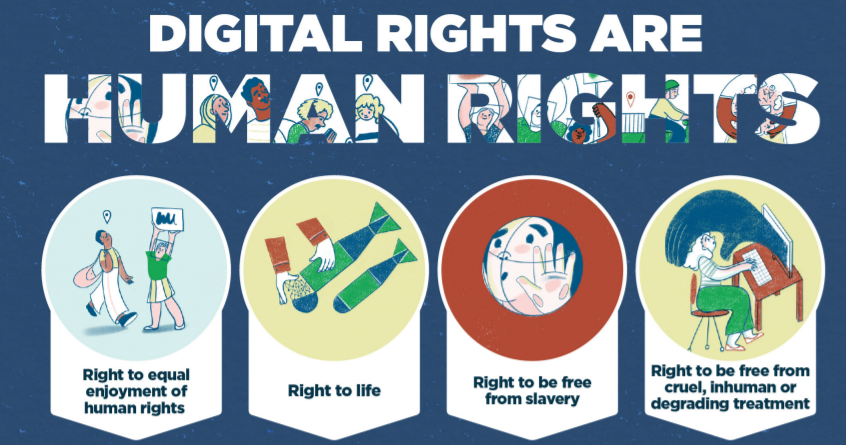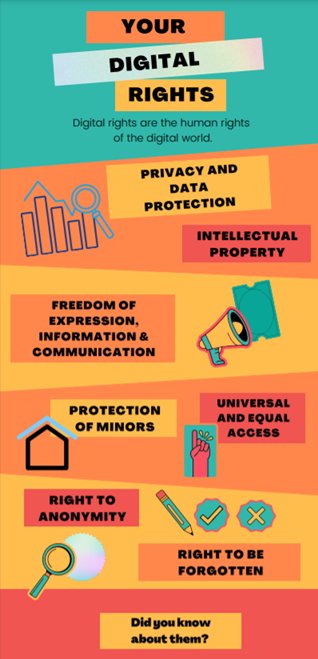In today’s world, in a reality that is more and more hyperconnected, fluid and digitized, digital rights equal human rights. That is why it is important to investigate what they are, why they are crucial and how we can protect them, for ourselves and others, as humans, digital entities and practitioners.
The Keynote speech by Michelle Bachelet at the UN High Commissioner for Human Rights (2019), addresses the most controversial and discussed digital right, which is “the right to Privacy and Data Protection”
“Alongside these very real dangers – under-regulation, over-regulation and deliberate misuse – we are also seeing unprecedented risks to the right to privacy. The dark end of the digital spectrum threatens not just privacy and safety, but undermines free and fair elections, jeopardises freedom of expression, information, thought and belief, and buries the truth under fake news. The stakes could not be higher – the direction of countries and entire continents. (…) People’s profiles, “scoring” and “ranking” can be used to assess their eligibility for health care, insurance and financial services. Digital technology is being used not just to monitor and categorize, but to influence. Our data is not just digitized, but monetized and politicized. Digital processes are now shaping us as well as serving us. We are right to feel profoundly concerned about how Big Data, artificial intelligence and other digital technologies are impacting our lives and society.”
Among artificial intelligence-powered systems and tools implemented with discriminatory algorithms, emerging technologies seem to be designed more and more to ensure mass surveillance. We finally realised that our Data, health informations, preferences as customers are being storaged and used to increment marketing sales and strategies in many different realms. Due to the Covid outbreak, we got used to live in a “digital bubble”, gifting our communications and thoughts to social media platforms and instant messaging apps. How healthy, and especially, how safe is all this?
From the limitations to freedom of expression to real censorship, from diffamation to online hate speech, the web is a dangerous spidernet that grasps all of us. We can’t really be aware of what this situation will lead to in the upcoming future. Cybersecurity is essential to ensure the freedom to exercise your digital rights, following the GDPR, for example by preserving the privacy through encryption of communications. If our data is being violated, in the EU the member countries have bodies such as the European Data Protection Committee (EDPC) or authorities like the European Data Protection Supervisor (EDPS) that investigate and prosecute infringements, imposing serious sanctions.
Unfortunately, following the Cambrigde Analytica scandal and the latest breaches of Data in many platforms, we can’t really be sure not to become victims of information leaks. But in other countries there are much less opportunities to access digital rights or even access human rights. In countries where civil rights are not contemplated, digital rights and the freedom of speech and thought are just an utopia, censorship is being applicated by the social media giants without any penal retaliation, and “as privacy becomes a privilege, protected in the Global North, data extraction from the Global South is likely to accelerate.”
🚨.@Instagram is actively censoring Palestine-related content on its platform.
We put together this report by listening to over 1,500 user experiences. THREAD ⤵️#SaveSheikhJarrah #FreePalestine pic.twitter.com/2nAoUJbogX
— Muslim (@Muslim) May 15, 2021
What most of the people are not aware of is the fact that the entertainment industry, and even platforms like Netflix are collecting our data. How much is Black Mirror a prediction of the future? The rating system shown in the episode “Nosedive” is already a scary reality in China, and in the episode “Bandersnatch”, your choice on how to continue the storyline, actually opened a discussion about how your own emotional choices are being given to the platform for free to use.
Following this thread, who hasn’t carelessly published thoughts and pictures on platforms that got to know us better that we probably know ourselves (or at least this is the risk)? That’s why is essential to be conscious of the Big Market behind the digital world and to educate children in using social medias carefully.
But do we know what digital rights are?
In order to investigate more the topic, I was pretty curious about the general perception regarding digital rights, and I asked on my personal IG profile a quick and easy poll for my audience. I formulated three simple questions, just to get an overview:

33 people replied to the first survey, and it is interesting to notice that more than half (52%) of the participants have never heard about Digital Rights. It is actually a topic of fundamental importance nowadays, but it is not something that unfortunately is not being discussed during the news or on social media. That same social media where people express themselves, and share their lives, thoughts and data. I intend to incentive a deeper conversation on this platform, and this I also the reason behind this poll: to make people aware of their rights and the consensus they are giving when ticking the “I agree” button.

It is curious that in the last poll, most of the people chose the correct answer, including all 3 digital rights listed. This can be totally random or it can mean that people in the end had already subconsciously interiorized what digital rights actually are. Many people linked digital rights to privacy, instead, as probably most of our discussions concern the usage of our data.
Another thought-provoking outcome is the fact that most of them wanted to learn more about Digital Rights. That’s why I decided to prepare a brief infographics below listing the main Digital Rights, which were collected in the Guide to Human Rights for Internet users. This guide aims to broaden the knowledge about the rights you own in the online environment, and to provide with guidance on what to do when your rights are being challenged. The guide links to the European Convention on Human Rights; it was adopted by the Committee of Ministers of the Council of Europe in Strasbourg on 16 April 2014.
As noticeable, there is not a proper legislation about digital rights, since every country decides to apply its own regulations, but common guidelines can be used as framework. I found an interesting initiative by the Digital Freedom Fund stating that “Digital Rights are Human Rights”, that makes us even more realise that the connection between the real and the digital world is costantly shrinking, and if we want to secure Human Rights, we have to make sure to secure Digital Rights too.
Every right entails a responsability: it is critical to remind ourselves the quote: “your rights end where mine begin” by Charles Deems. In fact, a significant issue that has grown incontrollably during this year in certain platforms, especially on Facebook, is the online violence. The United Nations Report on Cyber Violence against Women and Girls found that 73% of women have been exposed to, or experienced, forms of online violence. That is why I highly appreciated the initiative of Tlon, an Italian couple, founders of a “school of philosophy and imagination” and a publishing house, that finally changed the way we live social media, by raising awareness and offering legal solutions to fight the hate speech online, which is often total random and became a sad relief valve for people’s frustrations.
The usage of our private information is something that is beyond our ability to manage the problem itself. We can’t live without the digital world, but we should really be careful about the “privacy paradox,” which refers to the discrepancy between the concept of privacy reflected in what users say and what they actually do. To conclude, the booming of digitalization and the collection of privacy data is a vital topic that needs to be urgently addressed by and to every stakeholder. Awareness should be raised among civic society, institutions and organizations. It is important to increase our digital literacy and also to ensure a clearer legislation — national or international — that defines reasonable and legitimate uses of personal information and mandates companies to obtain the consent of the individuals involved.
We can indeed and sadly point out that the hyper digitalization acts as a new form of colonization in many countries. It’s crucial to get to know our enemy in order to tackle the risks it carries. Even though the enemy sometimes is “too volatile or too big” for us or anybody else.
Granting an equalitarian access to the internet and the digital world is not a solution and it doesn’t guarantee empowerment. It may narrow the digital divide, but lot of other educational and awareness-related activities need to be implemented beforehand.
This digital revolution has to be investigated from a human rights perspective on a much deeper level, and I will discuss how we can secure digital rights in the aid work practise and dignified storytelling in my next article.
If you want to be part of a broader discussion about Data and Datafication, check our collegues’ posts here!





